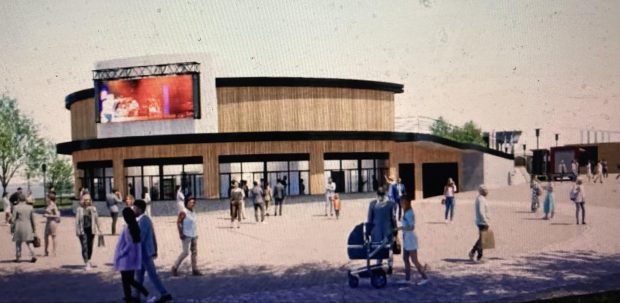The Aurora City Council on Tuesday approved the sale of up to $95 million in bonds for a number of previously-approved construction projects.
The bond sale is expected to have a roughly $9.25 monthly impact on the property tax bill of a $300,000 house, according to Aurora Chief Financial Officer Chris Minick. However, the city does have the option to use other funds to help repay the bonds, if other funds are available, which will be decided each year through the budget process, he said at Tuesday’s City Council meeting.
The tax-exempt general obligation bonds would go to pay for the construction of a relocated Fire Station 9, a new Fire Station 13, the new fire department headquarters building, the RiverEdge Park renovation and the recently-constructed new Public Works facility as well as the roadway improvement project around Farnsworth Avenue and Bilter Road.
All of the projects to be funded through the newly-approved bond sale have begun, and several are already “out of the ground,” according to Minick. These projects were approved under former Mayor Richard Irvin, and current Mayor John Laesch voted against some of them.
At Tuesday’s meeting, the $95 million bond issue passed with a 10-2 vote. Voting against the bond issue were Ald. Shweta Baid, 10th Ward, and Ald. Edward Bugg, 9th Ward.
Bugg, who attended the meeting remotely due to illness, said he would be voting against the bond issue because it includes the full cost of the Aurora Fire Department’s new headquarters building. Instead, there should be a review to see if the cost of that building could be paid at least in part from other sources like grants so the bond amount could potentially be lower, he said.
When his neighbors ask him why their property tax bills are going up, Bugg said, he wants to be able to say that he “turned every stone to find savings before I voted for that” and that he didn’t “push something through quickly.”
Other aldermen had similar concerns to Bugg, including Ald. Ted Mesiacos, 3rd Ward. Bugg, Mesiacos and Laesch voted against the construction of the fire department headquarters building when it came before the Aurora City Council last month in a meeting just hours before Laesch, who was at that time an alderman at-large, was sworn in as the next mayor.
In addition to his concerns about the cost and design of the fire department headquarters, Mesiacos also pointed out at Tuesday’s meeting that the Aurora City Council late last year raised the city’s tax levy by 4.87% in part to pay for construction projects. However, officials said at the time that, even with the levy increase, the tax rate was expected to fall to the lowest it has been since 2009.
Ald. Patty Smith, 8th Ward, said she was leaning towards voting against this bond issue but changed her mind because she realized, after various discussions, that it would stop the construction of fire stations, which would impact public safety, and stop the renovation of RiverEdge Park, which is a revenue-generator for the city.
Despite aldermen voting on the bond issue at Tuesday’s meeting, they were not deciding on the tax rate — that will be done in December, Smith pointed out.
“There’s nobody up here who wants a property tax increase,” she said, referring to her fellow aldermen. “We have to pay the same property tax increase everybody else does.”
Ald. Daniel Barreiro, 1st Ward, said the projects funded by the bond issue are needed because they are related to public safety, traffic improvements and economic development. Plus, since many of those projects have already started construction, there’s “no turning back.”
The Aurora City Council needs to consider how it will use the increased tax dollars expected from the new Hollywood Casino resort being constructed within the city, Barreiro said, because in the past those funds have been used in the place of property taxes to pay down bonds.
Now that the bond issue has been approved, the sale is expected to take place in late June and close in early to mid-July, according to Minick. He said that, although the city is now allowed to issue up to $95 million in bonds, the number will likely be closer to $90 million, which is the amount the city is actually looking to put into its project fund.
A presentation from Minick last month showed that, from the money the city would receive from the bond sale, roughly $7 million would go towards the construction of Fire Station 9, $4 million would go towards the construction of Fire Station 13, $35 million would go towards the construction of the new fire department headquarters, $18 million would go towards the roadway improvement project near Farnsworth Avenue and Bilter Road, $18 million would go towards the RiverEdge Park renovation and $6 million would go towards the construction of the Public Works building.
However, Minick told The Beacon-News that there may have been some minor changes in those numbers since that presentation.
The relocation of Fire Station 9 and the construction of the new Fire Station 13, plus the new fire department headquarters that is set to hold a relocated Fire Station 4, are being built at the recommendation of a 2021 plan that looked to lower emergency response times.
The new Aurora Fire Department headquarters building, in addition to housing fire administration and the relocated fire station, will also hold administrative space for the city’s Emergency Management Agency as well as the city’s Emergency Operations Center. It is set to be located on the same site as the current Aurora Police Department headquarters, making the site into the Aurora Public Safety Campus.
The currently under-construction RiverEdge Park renovation project will include a new backstage, a new entry on the southern edge of the park, a new beverage pavilion, a new VIP section and new restrooms, according to past reporting. The renovations are expected to increase the park’s capacity, which is currently about 7,300 for events and 6,500 for concerts, by about 2,500 people.
Much of the roadway construction along Farnsworth Avenue, Bilter Road and Church Road is connected to the new Hollywood Casino-Aurora resort, however, the city had already been planning to do roadwork in that area, according to past reporting.
Many of those projects, basically all but the new fire station headquarters building, were also partially funded through a separate two-part bond issue approved by the Aurora City Council late last year. City Council allowed staff to issue up to $40 million in bonds at that time, but the actual figure came out to around $35.6 million, Minick told The Beacon-News.
According to past reporting, the city always planned to issue additional bonds to help pay for these projects so that interest costs could be kept down by borrowing only the money the city needed at that time.
Despite the bonds, Laesch said at Tuesday’s meeting that the city was looking for ways to cut back on the budget, including by not moving forward on projects like the proposed City of Lights Center, by pausing or cutting back on some public works projects in the pipeline and by not rehiring for some vacant staff positions.
rsmith@chicagotribune.com




